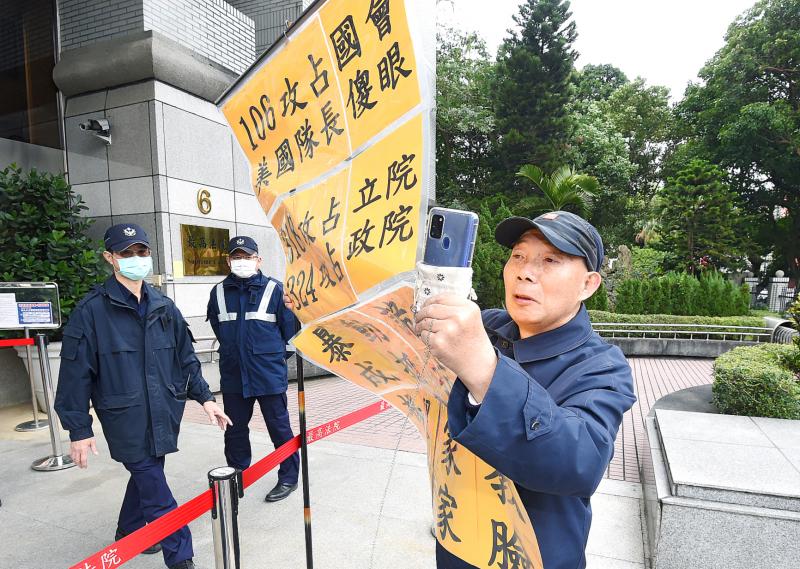The Supreme Court yesterday ordered the retrial of eight Sunflower movement figures sentenced last year to two to four years in prison over their roles in the occupation of the Executive Yuan in 2014.
In remanding the case to the High Court, the Supreme Court said that the defendants were exercising “civil disobedience” and should receive more lenient sentences.
The High Court in April last year sentenced the Sunflower movement figures, including Dennis Wei (魏揚), for inciting others to commit crimes related to the occupation of the Executive Yuan complex during the 23-day protest.

Photo: Liao Chen-huei, Taipei Times
The defendants appealed the case to the Supreme Court.
In its ruling yesterday, the court revoked the guilty verdicts and ordered a retrial, based on the argument that the defendants were exercising their “right of resistance” or “civil disobedience” as part of their right to freedom of expression.
The “right of resistance” is used to protect and restore a democratic constitutional order, and is legal and legitimate under the Constitution, the court said.
Although the Constitution does not explicitly stipulate the “right to resistance,” it should still be recognized based on the constitutional principles under popular sovereignty, it said.
Therefore, behavior that exercises the “right of resistance” can be used to defeat or mitigate the legal consequences of what might otherwise be unlawful conduct, it said.
The court can apply these rules related to behavior under extenuating circumstances, such as cases of self-defense, to reduce a defendant’s sentence or overrule any unlawful conduct, it added.
The court ruling also said that the High Court did not look into the reason for the defendants’ behavior, nor did it thoroughly investigate and explain if that behavior constituted the crime of inciting others to commit crimes.
The Sunflower movement was a protest against the then-Chinese Nationalist Party (KMT) government’s handling of a trade in services agreement with China. It began after then-KMT legislator Chang Ching-chung (張慶忠) rushed through the agreement without debate on March 17, 2014.
During almost 23 days of protests from March 18 to April 10, hundreds of people broke into the Legislative Yuan, while thousands demonstrated outside the complex.
One group, which included the eight defendants, attempted to occupy the nearby Executive Yuan on March 23, but were forcibly removed by police during the early hours of March 24.
The Taipei District Prosecutors’ Office indicted them in 2015 for inciting others to commit crimes, obstructing officials in carrying out their duties and damaging government property.
During the first trial, the Taipei District Court found them all not guilty. Prosecutors later appealed to the High Court, which overturned the initial verdicts.

Beijing could eventually see a full amphibious invasion of Taiwan as the only "prudent" way to bring about unification, the US Department of Defense said in a newly released annual report to Congress. The Pentagon's "Annual Report to Congress: Military and Security Developments Involving the People's Republic of China 2025," was in many ways similar to last year’s report but reorganized the analysis of the options China has to take over Taiwan. Generally, according to the report, Chinese leaders view the People's Liberation Army's (PLA) capabilities for a Taiwan campaign as improving, but they remain uncertain about its readiness to successfully seize

HORROR STORIES: One victim recounted not realizing they had been stabbed and seeing people bleeding, while another recalled breaking down in tears after fleeing A man on Friday died after he tried to fight the knife-wielding suspect who went on a stabbing spree near two of Taipei’s busiest metro stations, Taipei Mayor Chiang Wan-an (蔣萬安) said. The 57-year-old man, identified by his family name, Yu (余), encountered the suspect at Exit M7 of Taipei Main Station and immediately tried to stop him, but was fatally wounded and later died, Chiang said, calling the incident “heartbreaking.” Yu’s family would receive at least NT$5 million (US$158,584) in compensation through the Taipei Rapid Transit Corp’s (TRTC) insurance coverage, he said after convening an emergency security response meeting yesterday morning. National

Taiwan has overtaken South Korea this year in per capita income for the first time in 23 years, IMF data showed. Per capita income is a nation’s GDP divided by the total population, used to compare average wealth levels across countries. Taiwan also beat Japan this year on per capita income, after surpassing it for the first time last year, US magazine Newsweek reported yesterday. Across Asia, Taiwan ranked fourth for per capita income at US$37,827 this year due to sustained economic growth, the report said. In the top three spots were Singapore, Macau and Hong Kong, it said. South

PLANNED: The suspect visited the crime scene before the killings, seeking information on how to access the roof, and had extensively researched a 2014 stabbing incident The suspect in a stabbing attack that killed three people and injured 11 in Taipei on Friday had planned the assault and set fires at other locations earlier in the day, law enforcement officials said yesterday. National Police Agency (NPA) Director-General Chang Jung-hsin (張榮興) said the suspect, a 27-year-old man named Chang Wen (張文), began the attacks at 3:40pm, first setting off smoke bombs on a road, damaging cars and motorbikes. Earlier, Chang Wen set fire to a rental room where he was staying on Gongyuan Road in Zhongzheng District (中正), Chang Jung-hsin said. The suspect later threw smoke grenades near two exits